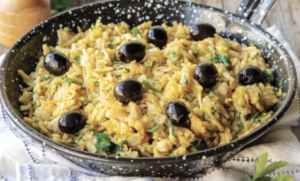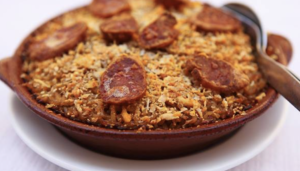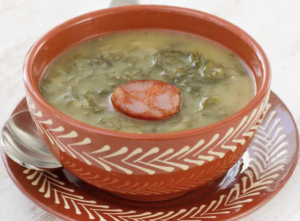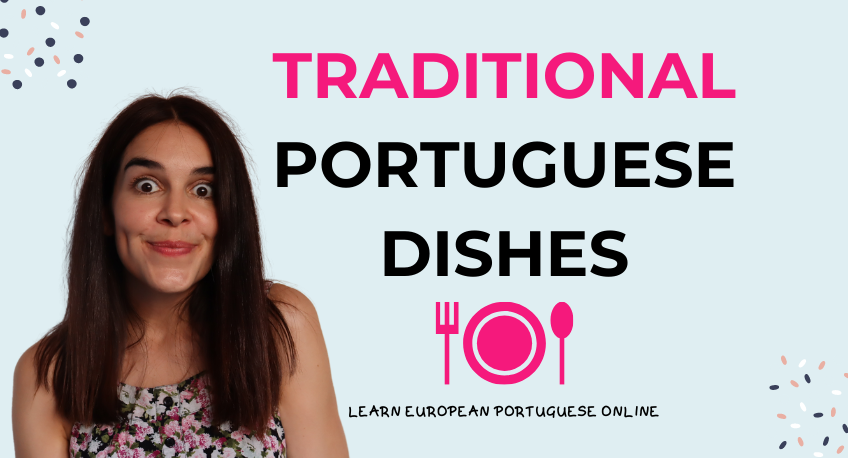In this post I bring you some nice traditional Portuguese recipes, because food is such an important part of culture for us, the Portuguese.
Some time ago, I was discussing this topic with a friend of mine that is not Portuguese. He said that in his country, they see food more as a mean to live, and not so much like something to actually take time with and enjoy.
For him, it was really weird at first to see that the Portuguese can have lunch for three hours, all together, while speaking and tasting a lot of different dishes.
In his culture, this does not happen. You eat to live. In Portugal, one might say, we live to eat (he-he).
In fact, we have a very rich cuisine, that does not stay behind the French or the Italian one and, according to a study from 2014, we are among the most healthy eaters in the world (we came in 12th, to be precise).
But what dishes are traditional from Portugal, you may be asking? Well, I put together 3 traditional Portuguese dishes for you. Come check them out 🙂
The classic Portuguese recipe – Bacalhau à Brás
This has to be one of those dishes that everyone loves. It is actually one of my favourite dishes, if not my favourite one!
This recipe uses the most often cooked and loved ingredient in Portugal – our lovely friend, the codfish.
- O bacalhau – the codfish
We have 1001 ways of cooking cod, so they say… I don’t know if this 100% accurate, but truth is we cook this fish in many, many different and original ways.
Bacalhau à Brás is one of them.
À Brás (Bras technique) means that the cod is served in small pieces and put together with onions, fried potatoes and scrambled eggs. This technique can be used with other ingredients, rather than codfish.
If you are a vegetarian, for example, you can substitute it for some veggies or mushrooms 🙂
Recipe #1 – Bacalhau à Brás
If you want to cook this at home, you can check some recipes on the internet. I have put together some of them for you, so feel free to check them out:

Easy Portuguese Recipe – Arroz de Pato
Arroz de Pato is duck rice. This is an all-time favourite of the Portuguese people.
- o pato – the duck
- o arroz – the rice
- o chouriço – the chorizo
It is a mix of duck, white rice, chorizo and aromatic herbs. Sometimes we put cheese on top and put it in the oven, making a kind of a gratin with it. The flavour is really nice. Hmmm…I am already feeling like eating now.
Did you know that we are the European country that eats more rice?
The history of the Duck rice is still a bit unknown, but a lot of researchers attribute it to the Chinese.
See, Portuguese people used to travel all over the world (discovering new countries and stuff…), so we contacted with a lot of cultures. The Chinese culture was one of those, and I am guessing we tasted the rice and REALLY enjoyed it.
Since then, duck rice has been on the plates of many Portuguese people, and I do not see it going anywhere so soon…
Recipe #2 – Arroz de Pato
So, now that you have enjoyed a bit of the history of Arroz de Pato, I would like to invite you to take a look at the following recipes from excellent pages:

Simple Portuguese Recipe – Caldo Verde
Yet another simple Portuguese recipe, Caldo Verde, is loved by many (not by me, though haha). This is the typical Portuguese recipe that you will see at late night festivals or parties, or when we celebrate São João or other festivities.
It will warm up your insides and make you happy (if you like it, that is… Ok, I don’t loooove it, but I do like it in certain occasions).
Caldo Verde is a soup and it literally means “green soup”. Caldo is just an older way to refer to a warm liquid that will feed you – like soup.
- a sopa – the soup
- o caldo – the soup (old version)
This dish is called like this because of its green colour. This is so because of its main ingredient – kale.
In Portugal, everyone eats soup. We try to eat it before the main dish. Mothers all over Portugal tell their children the importance of a good soup, and a common threat is:
- Se não comeres a sopa toda, não vais brincar! – If you don’t eat your soup, you will not go play.
Recipe #3 – Caldo Verde com Chouriço
Now, if you are curious about this dish, check out the recipes below. They will tell you what ingredients to put together to cook a delicious Caldo Verde.

So, this is it! These were the 3 Traditional Portuguese Recipes I wanted to tell you about today.
Please leave a comment below telling me:
1. what is your favourite Portuguese food of all time
2. if you have already experienced the long Sunday lunches in a Portuguese home
Also, if you want to share some of your recipes with us, you are more than welcome to do so.
Please leave me a like, and share this post with your friends and family, in case you think they will enjoy learning about the Portuguese cuisine.
I might be posting more of these in the future, so keep posted! But for now I am going to eat something, I feel quite hungry at the moment 🙂
Beijinhos, Mia


😃 I just saw this Blog post!! I need to remember to look more often. This is great!! I ordered some Bacalhau from a Portuguese Store a while back so I will make the Bacalhau à Brás and also want to try Bacalhau à Gomes de Sá and definitely going to try the Arroz de Pato as well. I have made several savory & sweet Portuguese dishes lately. When we visited Portugal earlier this year, we did not have any bad meals, actually our favorite was Leitão (I know baby pig) 😞 and of course the coffee and of course the pastéis de nata!! Another thing we noticed is, with all the delicious/gorgeous Portuguese food & sweets, very few people are heavy. Thank you for the links, I am a fan of 196 flavors. I also follow on youtube Momentos Doces e Salgados and a Portuguese American food blogger. Fixe article Mia 👍
Oh! Ainda bem que gostaste do meu artigo 🙂 I am glad you liked it! Yes, do come and check more often, that would be great. Thank you so much for commenting.
I am also glad you enjoyed Portuguese food. We do have a big variety of things.
I also used to eat and like leitão, but I just can’t eat it anymore..I cannot continue eating baby animals 🙁
I love animals and I even have the wish of being a vegetarian. It is just hard in Portugal, but I do try to eat less meat, although lately I have been eating a bit more again. I will go back to not doing it so often soon enough, I hope!
Café and Pastéis de Nata are a classic!
Thank you again for your feedback about my article.
Beijinhos,
Mia.